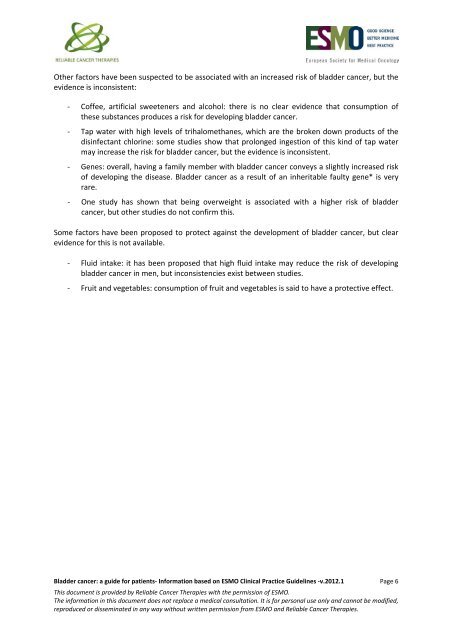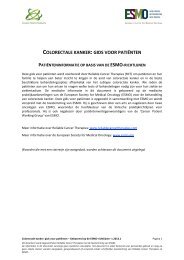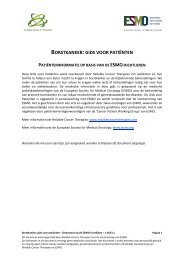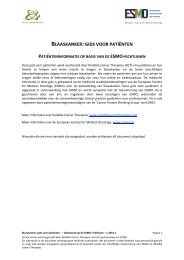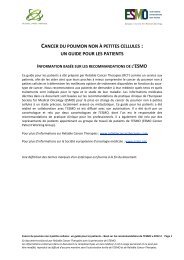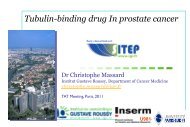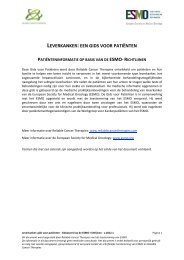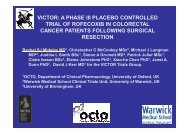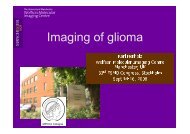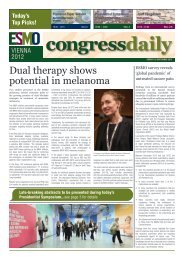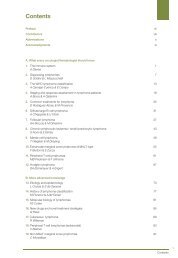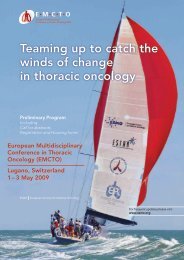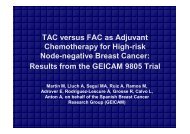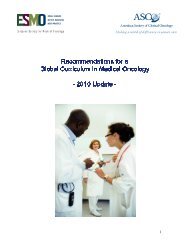Bladder cancer - European Society for Medical Oncology
Bladder cancer - European Society for Medical Oncology
Bladder cancer - European Society for Medical Oncology
You also want an ePaper? Increase the reach of your titles
YUMPU automatically turns print PDFs into web optimized ePapers that Google loves.
Other factors have been suspected to be associated with an increased risk of bladder <strong>cancer</strong>, but the<br />
evidence is inconsistent:<br />
‐ Coffee, artificial sweeteners and alcohol: there is no clear evidence that consumption of<br />
these substances produces a risk <strong>for</strong> developing bladder <strong>cancer</strong>.<br />
‐ Tap water with high levels of trihalomethanes, which are the broken down products of the<br />
disinfectant chlorine: some studies show that prolonged ingestion of this kind of tap water<br />
may increase the risk <strong>for</strong> bladder <strong>cancer</strong>, but the evidence is inconsistent.<br />
‐ Genes: overall, having a family member with bladder <strong>cancer</strong> conveys a slightly increased risk<br />
of developing the disease. <strong>Bladder</strong> <strong>cancer</strong> as a result of an inheritable faulty gene* is very<br />
rare.<br />
‐ One study has shown that being overweight is associated with a higher risk of bladder<br />
<strong>cancer</strong>, but other studies do not confirm this.<br />
Some factors have been proposed to protect against the development of bladder <strong>cancer</strong>, but clear<br />
evidence <strong>for</strong> this is not available.<br />
‐ Fluid intake: it has been proposed that high fluid intake may reduce the risk of developing<br />
bladder <strong>cancer</strong> in men, but inconsistencies exist between studies.<br />
‐ Fruit and vegetables: consumption of fruit and vegetables is said to have a protective effect.<br />
<strong>Bladder</strong> <strong>cancer</strong>: a guide <strong>for</strong> patients‐ In<strong>for</strong>mation based on ESMO Clinical Practice Guidelines ‐v.2012.1 Page 6<br />
This document is provided by Reliable Cancer Therapies with the permission of ESMO.<br />
The in<strong>for</strong>mation in this document does not replace a medical consultation. It is <strong>for</strong> personal use only and cannot be modified,<br />
reproduced or disseminated in any way without written permission from ESMO and Reliable Cancer Therapies.


